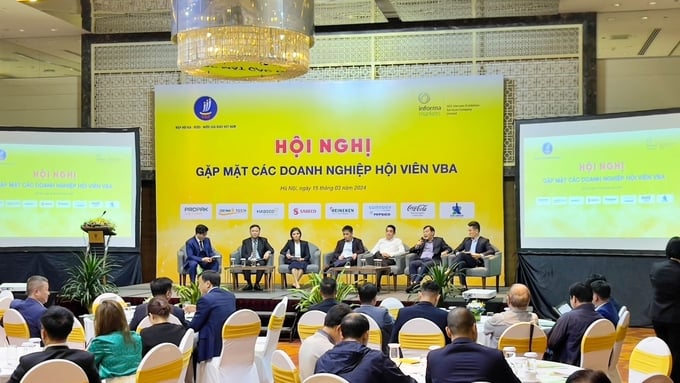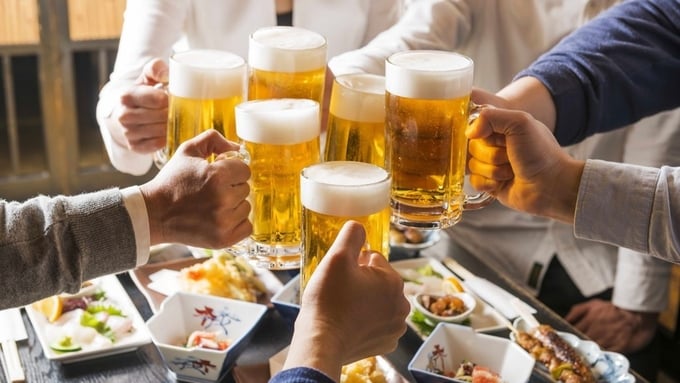May 28, 2025 | 19:58 GMT +7
May 28, 2025 | 19:58 GMT +7
Hotline: 0913.378.918
May 28, 2025 | 19:58 GMT +7
Hotline: 0913.378.918

Delegates attending the conference agreed that beverage industry businesses suffer many negative impacts.
Vietnam is currently applying the method of calculating relative Special Consumption Tax on beer and wine products. That is, applying a percentage tax rate based on the selling price. This unintentionally equates to the quality of the product inside, creating unfairness for the manufacturer. Because beer products with lower alcohol content are less harmful to health, sometimes they are taxed the same or higher than products with higher alcohol content but are sold cheaper by manufacturers to attract customers.
A typical example is the Special Consumption Tax rate on beer, which is 65% higher than the 35% tax rate on wines (with alcohol content below 20%). In terms of impact on consumer health, the higher the alcohol level, the greater the harmful effects. However, the current relative tax calculation method is unfair because beer products with low alcohol content sometimes have to pay more tax than products with higher alcohol content.
The current relative tax calculation method does not encourage consumers to choose products with low alcohol content and good quality. According to statistical data for 2018 - 2021, beer consumption in Vietnam does not decrease but tends to shift from high-priced products to lower-priced ones.
According to the Government's expectation, the draft Law on Special Consumption Tax (amended) will be submitted to the National Assembly Standing Committee at the 7th session of the 15th National Assembly in May 2024. After that, the draft will be consulted by the National Assembly at the 8th session in October 2024 and passed into law at the 9th session in May 2025.
Mr. Dau Anh Tuan, Deputy Secretary General and Head of the Legal Department of the Vietnam Confederation of Commerce and Industry (VCCI), assessed that the beer and alcohol industry would be affected by increasing taxes according to the roadmap, including sugary water products refreshment when the law is passed.
According to a VCCI representative, beverage industry businesses are suffering double negative impacts from the Covid-19 epidemic, as well as the effects of political conflicts and climate change worldwide. These policies make businesses "more and more difficult", according to Mr. Dau Anh Tuan. Therefore, he proposed to delay the increase in consumption tax and reduce VAT for businesses in the beer and alcohol industry.
In addition to special consumption tax, the beverage industry is subject to related policies such as Decree 100 on traffic penalties, and extended manufacturer and importer responsibility (EPR regulations).
Mr. Tuan's opinion at the Meeting with member businesses of the Vietnam Alcohol – Beer – Beverage Association (VBA) was shared by Mrs. Nguyen Thi Minh Thao, Head of the Business Environment and Competitiveness Research Department, Central Institute for Economic Management (CIEM) agrees.
Based on reports assessing the impact of special consumption tax on the beverage industry, Mrs. Thao emphasized: "Enterprises in general and businesses in the beverage sector in particular are facing very difficult times. Actions must ensure consistency with the Party and State's orientations and policies supporting business recovery and development."

The Law on Special Consumption Tax (amended) is expected to be passed in May 2025.
Before expanding tax subjects and increasing special consumption tax, Mrs. Thao recommended that the drafting agency should comprehensively assess the impact. In addition, CIEM representatives proposed postponing the deadline or having a roadmap for applying a special consumption tax on sugary beverages.
This position is considered a stepping stone for businesses and industries to build adaptation strategies and product improvement plans while depreciating old technology lines.
The beverage industry contributes about VND 60 trillion to the state budget annually while creating millions of jobs.
Mr. Nguyen Duy Hung, Vice President of VBA, admitted that the beverage industry has recorded a sharp decline in revenue and profits in recent years. As a result, commercial systems, restaurants, entertainment areas, and input supply chains are all affected, with a 15-20% decrease. Some indicators even decreased by 30-40%.
VBA leaders hope that the National Assembly, the Government, ministries and branches will consider and evaluate policies harmoniously, under actual conditions, to come to life quickly.
VBA also recommends delaying the roadmap to amend the Special Consumption Tax Law (amended), at least from 2025 onwards, creating conditions to help businesses recover, stabilize and gradually develop again.
“The beverage industry and businesses are always committed to actively contributing to socio-economic development, contributing to the budget, protecting the environment, stabilizing social security and jobs for workers”, Mr. Hung shared.
Mr. Lam Du An, Deputy General Director of SABECO, states that in 2021, business growth decreased by 10 - 15% compared to 2019; In 2022, revenue decreased by 7% and in 2023, revenue decreased by 11%; Pre-tax profit decreased by 23; Input prices increased by 20 - 40%, while selling prices could not increase.
Translated by Tuan Huy

(VAN) The mutual export of agrifood products between the European Union (EU) and the United Kingdom (UK) must occur again without certification, border controls or other red tape. This was agreed at the UK-EU summit.
/2025/05/22/5121-2-173645_677.jpg)
(VAN) NBSAP Tracker identifies strengths and areas for improvement in the National Biodiversity Strategy, based on each region’s priorities and capacities.

(VAN) The draft amendment to the Circular on rice export trading stipulates a periodic reporting regime for rice exporting enterprises.

(VAN) Dong Thap farmers attained an average profit margin of 64% during the summer-autumn 2024 crop (first season), while An Giang and Kien Giang farmers followed with 56% and 54%, respectively.

(VAN) As a doctoral student doing research on renewable energy and electrification at Harvard University, the author shares his musings on electricity, nature, and countryside memories.

(VAN) The decree on Extended Producer Responsibility (EPR) ensures transparent management and disbursement of support funds, avoiding the creation of a “give-and-take” mechanism.

(VAN) Hue City rigorously enforces regulations regarding marine fishing and resource exploitation, with a particular emphasis on the monitoring of fishing vessels to prevent illegal, unreported, and unregulated (IUU) fishing.